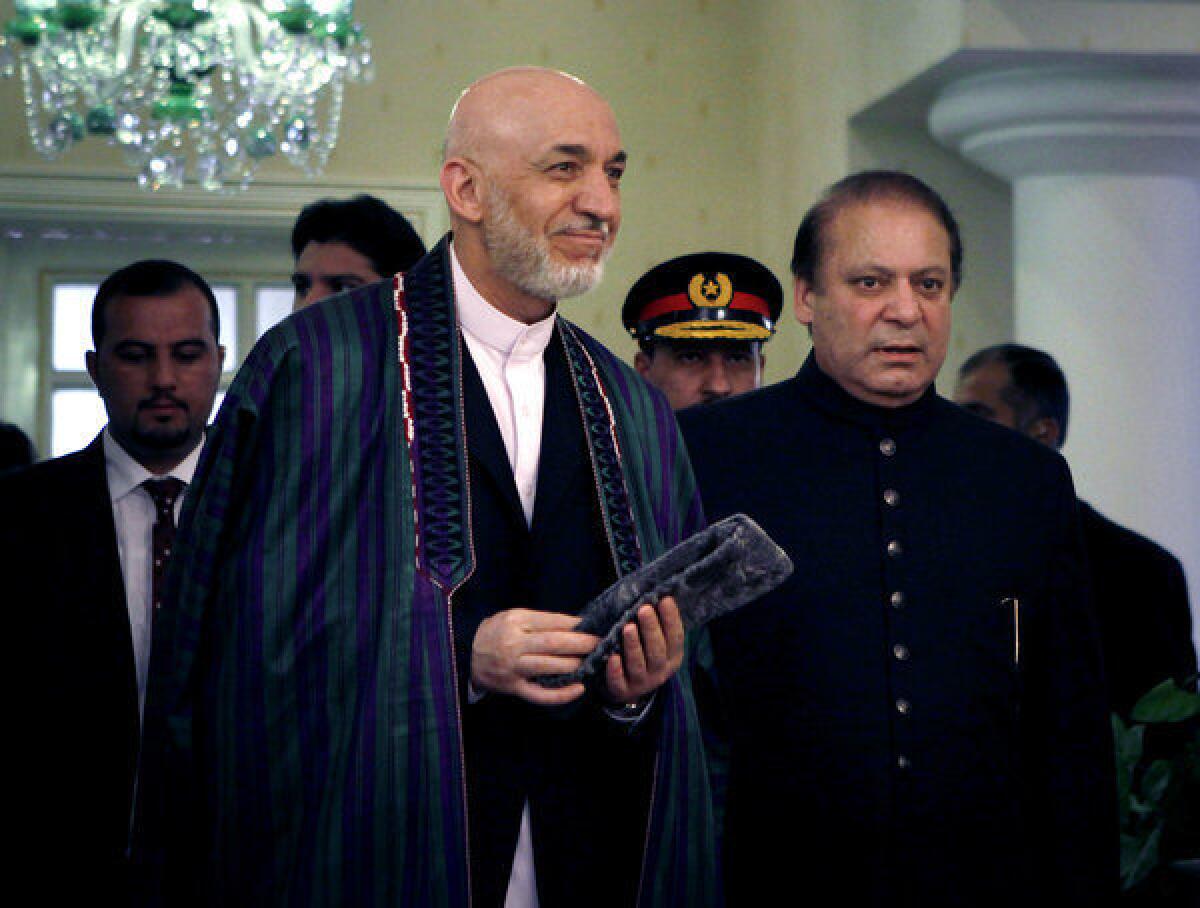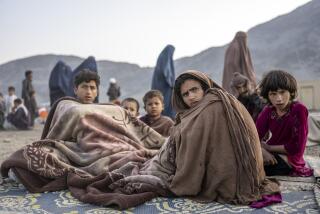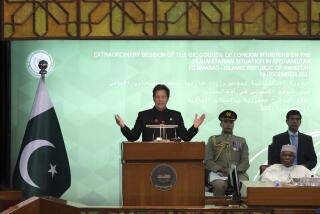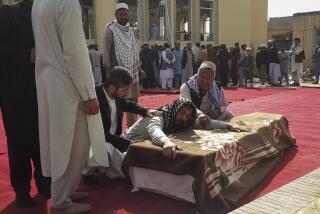Afghan, Pakistani leaders meet, pledge cooperation

- Share via
ISLAMABAD, Pakistan – Afghan President Hamid Karzai met Monday with Pakistan’s prime minister and won a pledge of support for carrying out a joint campaign against militancy, jump-starting peace talks with the Taliban and improving economic ties.
The visit, Karzai’s first to the Pakistani capital of Islamabad since Prime Minister Nawaz Sharif was elected in May, was important symbolically. And a decision to extend talks into a second day suggested that the discussions were substantive.
But analysts questioned whether the meetings would lead to a significant breakthrough given that Karzai has only eight more months in power, insurgents retain a strong grip over both countries and many of the problems in Afghan-Pakistani relations are deeply rooted.
Afghanistan has long held that Taliban militants who attack its territory find safe havens in northwest Pakistan. Many analysts also believe elements within Pakistan’s powerful military establishment encourage insurgents as a way to bolster the country’s influence in the region, a contention Islamabad strongly denies.
Television footage showed the two men chatting, exchanging smiles and appearing relaxed in their one-on-one meeting in a large room, both men dressed in traditional shalwar kameez and coats.
Karzai also reportedly called on Pakistan to release high-ranking Taliban prisoners who might help spur peace talks, including the Taliban’s second-in-command, Mullah Abdul Ghani Baradar, who was arrested in 2010 in Karachi reportedly after he tried to foster a direct dialogue with Kabul.
But some observers questioned what that would achieve.
“Pakistan has earlier released prisoners, and they did not help in reconciliation efforts,” said Rustam Shah Mohmand, an analyst based in Peshawar and former Pakistani ambassador to Afghanistan. “According to the Taliban, these prisoners are no longer important to them. They believe the released prisoners will speak their captors’ language.”
While Afghanistan and Pakistan welcome deeper cultural ties, Karzai told journalists at a news conference that “for the two countries, the primary concern is lack of security for its citizens and the continued menace of terrorism attacking both our populations, our governments, our soldiers and our security forces.”
In comments carried live on television after the meeting, Sharif pledged to extend “all possible facilitation” for peace talks between Kabul and the Taliban, adding that the peace and reconciliation process must be “Afghan-owned and Afghan-led.” Strong trade and economic partnership must underpin bilateral relations, he said.
The Taliban has refused to negotiate with Karzai, dismissing him as a U.S. puppet. Karzai’s visit follows a failed attempt in June to jump-start peace talks in the Qatari capital of Doha.
Many countries in the region – including India and Pakistan -- are jockeying for regional advantage as foreign combat troops prepare to leave Afghanistan by the end of 2014. India is wary of Pakistan playing an intermediary role with the Taliban, a position that New Delhi believes would bolster Islamabad’s influence.
At a seminar in New Delhi on Friday, Indian Foreign Minister Salman Khurshid reportedly expressed concern that Kabul was talking to the Taliban. “We are not sanguine about some of the armed groups that Afghanistan is talking to, but that is for Afghanistan to decide,” he said, according to India’s Business Standard newspaper.
Analysts said Monday’s meeting was a good first step, but the countries had a long road ahead. “The Taliban should stop warring and killing,” said Wadir Safi, a political analyst and professor at Kabul University. “If they want to be part of this country, now is the time to come to an agreement and use this chance for the peaceful future of Afghanistan.”
Pakistan analyst Mohmand added that getting the Taliban to the negotiating table will not be easy. The group wants to deal directly with the United States on the withdrawal of NATO troops, not Karzai’s government, which they believe has little authority to make important decisions.
The Taliban also has an interest in speaking with other ethnic groups in Afghanistan, including the Uzbeks, Tajiks and Hazaras, he said, in order to sketch out a power-sharing arrangement, consider how the country should be run and what a post-2014 road map might look like.
“There are too many issues and they are very complicated,” Mohmand said, adding that Karzai is rapidly becoming a lame duck. “Pakistan may be able pressure the Taliban into holding talks, but it won’t be able to pressure them into signing an agreement or making the talks successful.”
ALSO:
Deadly raid could derail Israeli-Palestinian talks
Snipers attack U.N. chemical weapons team in Syria
Snowden’s Moscow stay an accident, Russian paper reports
Twitter: @markmagnier
Special correspondent Khan reported from Islamabad and Times staff writer Magnier from Kabul. Special correspondent Hashmat Baktash in Kabul also contributed to this report.
More to Read
Sign up for Essential California
The most important California stories and recommendations in your inbox every morning.
You may occasionally receive promotional content from the Los Angeles Times.










